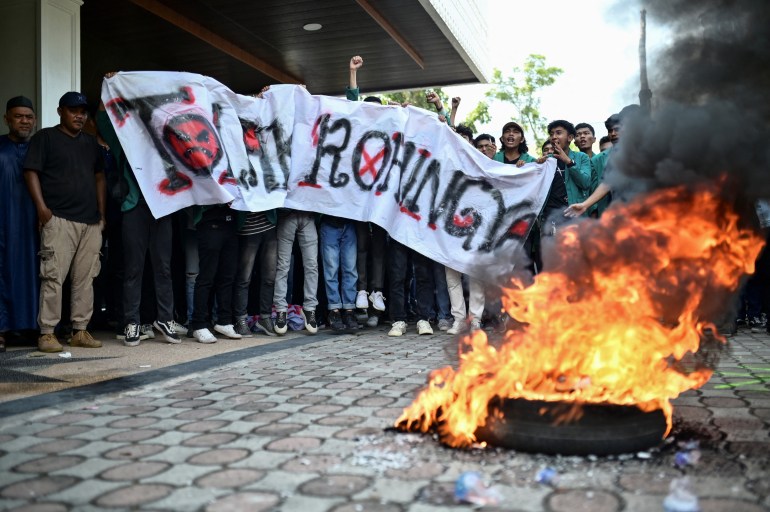Large crowd storms into building housing the refugees in the city of Banda Aceh, saying they should be deported.
Hundreds of university students in Indonesia’s westernmost province of Aceh have stormed a temporary shelter for Rohingya refugees, demanding they be deported.
Protesters on Wednesday forced more than 100 Rohingya out of a convention centre in the city of Banda Aceh, in the latest episode of discrimination against the persecuted minority group from Myanmar.
More than 1,500 Rohingya refugees have arrived on the shores of Aceh since mid-November in what the United Nations says is their biggest influx in eight years.
Some of their boats have faced rejection by Indonesian locals and in some cases, returned to sea.
Videos of the incident showed the students, many wearing jackets with different universities’ insignias, running into the convention centre’s basement, chanting “Kick them out” and “Reject Rohingya in Aceh”.

The students were also seen kicking the belongings of the Rohingya men, women and children seated on the floor and crying in fear. The refugees were then led out, some carrying their belongings in plastic sacks and taken to trucks.
The protesters burned tyres and scuffled with the police guarding the frightened Rohingya, but officers ultimately permitted the removal of the refugees by the students, according to the AFP news agency.
Police helped the refugees board the trucks before they were taken to another government office nearby.
![Rohingya refugees crowd into a vehicle for relocation to a nearby government building after demonstrating university students forced them out of the current government facility, in Banda Aceh on December 27, 2023. [CHAIDEER MAHYUDDIN / AFP]](https://www.aljazeera.com/wp-content/uploads/2023/12/roh-1703686131.jpeg?w=770&resize=770%2C513)
The United Nations Refugee Agency (UNHCR) said in a statement it was “deeply disturbed to see a mob attack on a site sheltering vulnerable refugee families, majority being children and women” and called for better protection.
“The mob broke a police cordon and forcibly put 137 refugees on two trucks, and moved them to another location in Banda Aceh. The incident has left refugees shocked and traumatised,” it said.
The UN agency added that the attack was the result of a coordinated online campaign of misinformation and hate speech.
Many people in Aceh, who themselves have memories of decades of bloody conflict, have been sympathetic to the plight of their fellow Muslims.
But others have said their patience has been tested, claiming the Rohingya consume scarce resources and occasionally come into conflict with locals.
“We protested because we don’t agree with the Rohingyas who keep coming here,” Kholilullah, a 23-year-old university student, told AFP.
Indonesian President Joko Widodo has blamed the recent surge in arrivals of Rohingya on human trafficking, and pledged to work with international organisations to offer temporary shelter.
Indonesia is not a signatory to the UN refugee convention and has said it cannot be compelled to take in refugees from Myanmar, calling instead on neighbouring countries to share the burden and resettle the Rohingya who arrive on its shores.









